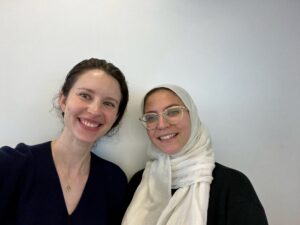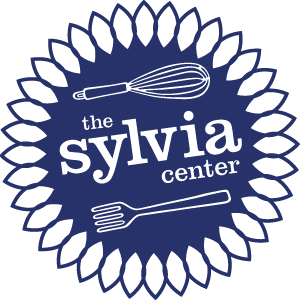 Left to right: Hannah Glass and Sondos Khattab, 2023 Sylvia Center Dietetic Interns
Left to right: Hannah Glass and Sondos Khattab, 2023 Sylvia Center Dietetic Interns
Meet Sondos and Hannah, two of The Sylvia Center’s dietetic interns. While studying Dietetics and Clinical Nutrition Services at Hunter College Integrative Program in Nutrition and Dietetics, Sondos and Hannah joined our team in the fall of 2023 and taught our Cooks for Health curriculum at elementary and middle schools around the city. Get to know them in this interview as they discuss and debunk fad diets, and explore their passion for fostering change as future dietitians.
- How did you get into food and nutrition?
Sondos:
I’m from Egypt, moved here two years ago, and now live in NJ. I studied Nutrition and Dietetics at undergrad level in the United Arab Emirates. I also did one year of an MA in food chemistry, but I didn’t love the chemistry part, and I missed the nutrition, so I switched back to an MA in Nutrition and Dietetics.
Hannah:
I was born in New York, but grew up in California and went to UC Davis for undergrad, majoring in History. After that, I realized I spent all my spare time teaching myself how to cook, and decided I should work in restaurants to learn more. I did that for around seven years, first in savory then as a pastry chef. Pre-pandemic I’d already decided I didn’t want to work in restaurants anymore. I was already considering the nutrition route, and then during the pandemic I started meal-prepping for my cousin who was going through a brain cancer diagnosis and chemo. It was really gratifying to be able to help her and her wife in that way, to provide support using the skills that I had. That crystalised the path for me.
- What areas of nutrition/dietetics are you most interested in?
Sondos:
It’s hard to choose one specialty. There’s so many. I like clinical work in general, working in hospitals and with in-patients. I like the diversity of the in-patient setting, because you get to meet so many people with different illnesses, some who’ve had cardiovascular surgery, some who have diabetes or GI problems. I like the hospital setting.
Hannah:
GI, oncology, prenatal, pediatric care, diabetes. I’m less interested in weight management, because there’s so many people who are doing that already. I’m more drawn to the community-side of things. I like being closer to food and having the opportunity to cook with people. I really enjoyed the work we did at The Sylvia Center, getting to work with kids and seeing them grow and discover new foods.
- What nutrition myths would you like to bust?
Sondos:
“Carbs are bad. Fat is bad”. The idea that if you eat a lot of protein, you’re going to be healthy, and it doesn’t matter the type or how you eat it. We need a healthy balanced diet with the whole package of protein, fats, and carbs. It’s one of the main reasons people have such bad relationships with food, and why a lot of people don’t know their hunger cues or what foods make them feel bloated. All these fad diets make you believe, “I need to stop eating this, this is bad for me.”
When you’re taught this at a young age, you start to eat in an unbalanced way. I don’t like to label anything as bad or good. Chocolate is good for you if it makes you happy.
Hannah:
I completely agree. I’m coming at it from a perspective of trying to promote “plenty” and diversity. There’s so many cuisines around the world that can be defined as a healthy diet. Not just Mediterranean and Japanese.
We don’t have to be so restrictive, unless the food item harms your body. We should find joy in that plenty. Having as many plants in your diet as possible is really what makes a diet healthy (I think most Americans are deficient in fiber), but that doesn’t mean there isn’t room for chocolate and cupcakes and other things.
- What are your go-to weekday meals?
Sondos:
A quick protein, like salmon, chicken, or shrimp, some sautéed vegetables, and a carb like rice or pasta. If I have time, I try to make a salad. The TSC recipe for Kung Pao Cauliflower is really good and easy.
Hannah:
I have steel-cut oatmeal every day of the week and I add nuts, chia seeds, and frozen berries (cheaper and better in the winter). For dinner, pastas are on a regular rotation. I like making Pasta alla Puttanesca, which has tomatoes, olives, garlic, capers, and anchovies, and I’ll add tuna for protein. I eat a lot of legumes. Sometimes I’ll make a big batch of lentils and roasted veggies, with a piece of toast with rubbed garlic. I like the TSC recipe for Burst Cherry Tomato Pasta, and cherry tomatoes are usually pretty good year-round. I like to make a pulled oyster mushroom taco: I season, shred and roast them, almost like carnitas.
- What have you been doing at TSC? What has been your favorite area?
Sondos:
We got to visit so many different communities and neighborhoods. I’ve been to Staten Island, the Bronx, the Lower East Side. One of the most important things I learned was how to tailor nutrition information for the students. If the students were predominantly Chinese, I’d give examples of Chinese vegetables and dishes. It was really fun to cook with the students and see how much they learned in such a short time. We also did a presentation on nutrition myths and how to spot nutrition fallacies and fake information on social media, specifically TikTok. We presented it to middle schoolers and it was great!
Hannah:
Getting to work with students over the course of months is really where you see the magic in TSC programs. You see them grow, learn, and start to enjoy things more as they get comfortable. Making cooking fun is so important. The times we were able to goof around with the students a little bit, and laugh or make games out of cooking was really nice. Chef Sam created a Kahoot! game, and it was great to see the students remember things we taught them.
- What takeaways do you have from working with TSC that you will carry into your future work?
Sondos:
It was nice to work with all different age groups, and all the classes had different personalities. I learned how to think on my feet.
Hannah:
TSC programs should be a standard for every school at every age. It’s so critical, not just in terms of improving what kids eat, but also giving them the skills and confidence to be able to take charge of their own diet. It’s so important for the adults they’ll become.


